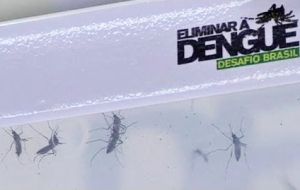MercoPress. South Atlantic News Agency
Brazil World Cup host cities with an early warning system for dengue
 The warning system specifically predicts the risk of dengue infections in 553 micro-regions of Brazil
The warning system specifically predicts the risk of dengue infections in 553 micro-regions of Brazil A heightened risk of an outbreak of dengue fever during the upcoming soccer World Cup in Brazil has prompted a high alert in three out of 12 host cities. For the first time, scientists have developed an early warning system that predicts the risk of dengue fever infections throughout parts of Brazil.
The warning system specifically predicts the risk of dengue infections in 553 micro-regions of Brazil during the World Cup soccer competition. The estimates, which are published in 'The Lancet Infectious Diseases', indicate that there is a high enough possibility of an outbreak to issue a high-alert advisory in Natal, Fortaleza, and Recife, three northeastern venues. However, the risk is expected to generally be low in each of the 12 host cities.
According to the World Health Organization dengue is transmitted by a mosquito bite after the insect has been infected with one of the four dengue virus serotypes. This is a febrile illness that affects infants, young children and adults, with many symptoms appearing within three to 14 days following the infective bite. Symptoms vary, ranging from mild fever to a very high fever, a severe headache and joint and muscle pain. Severe dengue primarily affects children and may result in death.
Dr. Rachel Lowe, lead author, from the Catalan Institute of Climate Sciences in Barcelona, Spain, said in a statement, “Recent concerns about dengue fever in Brazil during the World Cup have made dramatic headlines, but these estimates have been based solely on averages of past dengue cases. The possibility of a large dengue fever outbreak during the World Cup, capable of infecting visitors and spreading dengue back to their country of origin, depends on a combination of many factors, including large numbers of mosquitoes, a susceptible population, and a high rate of mosquito-human contact.”




Top Comments
Disclaimer & comment rules-

-

-

Read all commentsAnd now the mossies are after them, and I don't mean the muslims.
May 20th, 2014 - 06:12 pm 0Can it get any worse? Oh yes it can, just wait and see.
Good idea about the warning programme though.
BBC World Service just reported that the Brazilian Police ARE going on strike during the World Cup.
May 21st, 2014 - 03:06 am 0It's official now.
ho hum. Pass the popcorn. I'm staying in London.
I've got my repellent. I'll be there.
May 22nd, 2014 - 12:46 am 0Commenting for this story is now closed.
If you have a Facebook account, become a fan and comment on our Facebook Page!